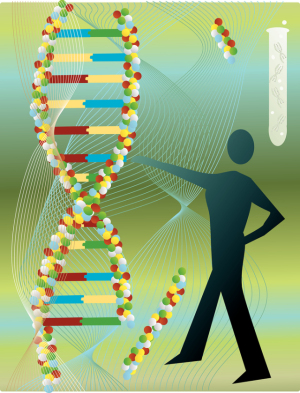In Autism, Evidence for Gene Expression Gone Awry
by
Brendon Nafziger, DOTmed News Associate Editor | April 14, 2010

Exploring the genetic
association with autism
Chemical changes to genes governing brain cell death, the body's daily rhythms, and muscle tone are linked to autism, according to a brace of new studies, offering promising new biomarkers and a target of treatment for the disorders.
A study appearing online in the FASEB Journal found that two genes were chemically "tagged" in a way that turned them off in autistic subjects, but not in their non-autistic identical twins and siblings. Differences in protein products of the genes were also found in parts of the brains of autistic subjects removed during autopsies, when compared with the brains of those without the disorder.
The genes, dubbed BCL-2 and RORA, showed evidence of epigenetic changes. Epigenetics is the study of hereditary changes in gene expression that don't involve alterations to the DNA sequence. In the study, the two genes in autistic subjects underwent a fairly well understood epigenetic process called methylation: that is, they had picked up extra methyl groups, causing the genes to be under-expressed.
TWIN MYSTERY
Epigenetics became an interesting target for the researchers because in many cases of identical twins only one is autistic. As identical twins have the same genes, this suggests that autism could not be fully genetic.
Plus, the sheer number of genes differently expressed between autistic and non-autistic controls in previous studies rules out a pure genetic explanation, according to Valerie Hu, Ph.D., senior author of the paper and a professor of biochemistry and molecular biology at George Washington University Medical Center in Washington, D.C. In one severe type of autism, involving language impairment, thousands of genes are differently expressed when compared with non-autistic controls, she says.
"You can't possibly have hundreds or thousands of mutations," Hu tells DOTmed News. "The most likely explanation is you're having disruption of epigenetic mechanisms that control batteries of genes."
TWO GENE CANDIDATES
For the study, the researchers looked at cell lines taken from three pairs of identical male twins where one twin was diagnosed with an autism spectrum disorder (ASD), but the other wasn't (though, typically, the other twin showed mild symptoms too subtle to merit a clinical ASD diagnosis). They then looked at cells from non-autistic volunteers, as well as, for two of the pairs, cells from non-autistic siblings.
For more precise measurements of protein expression in the brain, they also examined slices taken from the brains of cadavers -- autistic and non-autistic -- carefully matched for age and sex.
